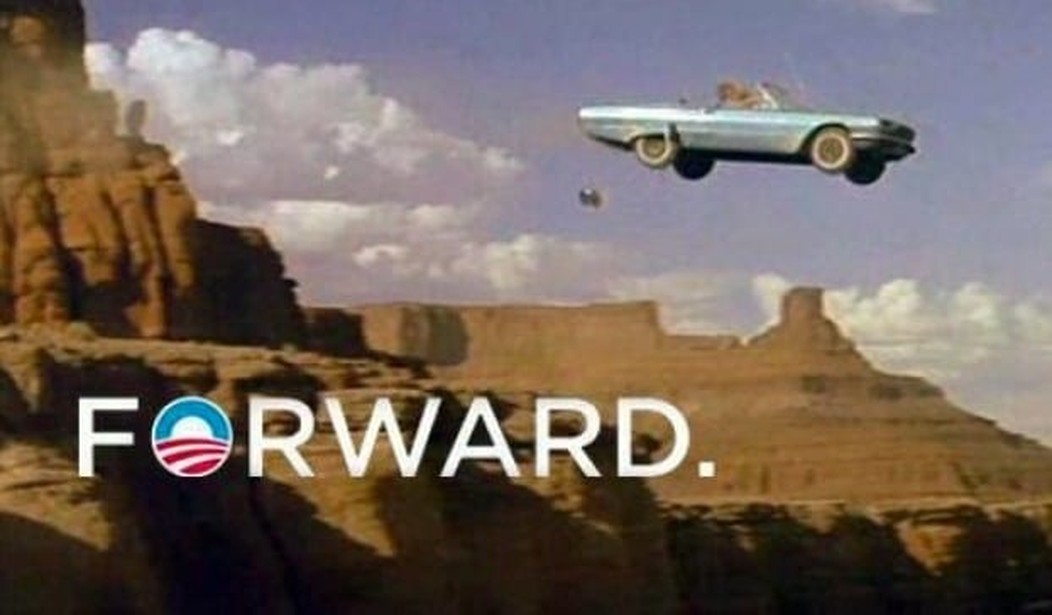One of the things the left is really go about is coming up with catchy slogans. Some of them are rather unfortunate, like calling your plan to stamp out inflation the Moral Equivalent of War (MEOW), some are ridiculous, like the War on Women, but the fact remains that if you can name something you go a long way towards determining how people view the subject. (As an aside, none of these compare with naming your terrorist group the Moro Independent Liberation Front or MILF. Don’t they have porn in the Philippines?) Did FDR illegally arm Great Britain in violation of the Neutrality Act and the expressed will of Congress? Or did the United States become the Arsenal of Democracy?
The first major test for John Boehner and the GOP caucus in the upcoming lame duck session of Congress will be confronting a newly elected and freshly emboldened Barack Hussein Obama over a series of issues that have been named by the left and its stenographers in the media as the “Fiscal Cliff.”
Powerful imagery, eh. Going over a cliff. But is that really what will happen.
Yesterday I proposed that the GOP should simply walk away from negotiations. If they do the Democrats will get what they want: tax increases. And we will get what we want: spending cuts. If we negotiate we are nearly guaranteed that the GOP will give the Democrats the tax increases and extract absolutely nothing in return.
To be clear here, I consider the 2013 sequestration to be superior to any “Grand Bargain” likely to be struck for the simple reason that a “Grand Bargain” will take place over a decade. The sequestration by contrast happens in 2013 and though some of it is blue smoke and mirrors it contains a lot of real cuts.
First a quick recap of what is involved. On January 1 the following changes occur in existing tax policy.
The tax rate reductions implemented by President Bush in 2001 and 2003 will expire. This will increase taxes on Americans, or as the Democrats would say it increases the government’s income, by $281 billion. This means the average household will pay between $60 and $400 per month in additional taxes, depending upon your income. Go here for a detailed table of how the rates would change and here for what it means state by state. The states most heavily hit would be CT, NY, NJ, MA, and CA, in order.
Some objected yesterday that this would cause a stock market crash. That is patent nonsense. The equities market is valued in the tens of trillions of dollars (over a hundred trillion if you consider world markets). $281 billion transferred from consumers to the government, but still spent on goods and services provided by companies listed on the NYSE and NASDAQ will have no effect.
The payroll tax holiday enacted in 2010 will expire increasing payroll taxes by 2 points. For someone earning $50K per year this means you will lose $19 per week. All told this increases taxes by $115 billion. As preserving Social Security and Medicare are things everyone is interested in, this should go away by acclamation.
The Alternative Minimum Tax will expand as a the eligibility will ensnare more taxpayers. It will raise about $40 billion and will impact about 27 million taxpayers. The good news is that if your make $50K and live alone you are now considered wealthy enough to pay the same tax penalty as millionaires. Welcome to the 1%, bitches.
Extended unemployment benefits will expire decreasing government outlays by $34 billion. This will undoubtedly cause some hardship. An estimated 2 million people will lose their benefits from this program.
Obamacare will come into effect and begin collecting taxes, this will increase government revenues by $24 billion.
The “doc fix” for Medicare will expire reducing government outlays by $14 billion. (This will be fun to watch play out as Obamacare promised a permanent “doc fix” as a way of buying the American Medical Association.)
And finally some $78 billion in spending authority for 2013 will be cut.
Let’s not fool ourselves here. The Democrats are interested in exactly two parts of this deal. First, they want to preserve the $78 billion in spending. Second, they would like to keep the extended unemployment benefits. They have no interests in curbing the taxation portion of the problem. We know they really don’t believe that tax rates have an impact on economic policy. For instance, this from well known imbecile and economic illiterate Chuck Schumer:
Boehner said he could agree to a deficit reduction agreement that raises new federal revenues but he said those funds must come from economic growth spurred by tax reform. Republicans, including members of the Senate’s Gang of Eight, have argued that adequate revenues can be raised through tax reform without increasing the net rates of taxation.
Schumer derided the theory that substantial revenues can be raised without increasing the tax burden on the wealthy.
“Part of his speech he talked about dynamic scoring, this idea if you cut taxes you increase revenues,” Schumer said.
“It’s about time we debunked that myth, it’s a Rumpelstiltskin fairy tale, dynamic scoring. You may remember Rumpelstiltskin was the fairy tale figure who turned straw into gold,” he added, making reference to the popular German children’s tale from the 19th century.
When one looks at this one sees some pain but nothing that couldn’t be sustained. Quite honestly, one lesson we should learn from this is to never, ever, ever again get talked into a temporary change in tax rates. That is lunacy because we’re going to end up giving away a lot of stuff in the future, and on a permanent basis, to preserve that which was supposed to be temporary.
So my recommendation remains. The GOP should simply walk away from this. As it turns out I’m not alone. The Congressional Budget Office has released a report today on the “Fiscal Cliff”. What do they have to say?
Substantial changes to tax and spending policies are scheduled to take effect in January 2013, significantly reducing the federal budget deficit. According to CBO’s projections, if all of that fiscal tightening occurs, real (inflation-adjusted) gross domestic product (GDP) will drop by 0.5 percent in 2013 (as measured by the change from the fourth quarter of 2012 to the fourth quarter of 2013)—reflecting a decline in the first half of the year and renewed growth at a modest pace later in the year. That contraction of the economy will cause employment to decline and the unemployment rate to rise to 9.1 percent in the fourth quarter of 2013. After next year, by the agency’s estimates, economic growth will pick up, and the labor market will strengthen, returning output to its potential level (reflecting a high rate of use of labor and capital) and shrinking the unemployment rate to 5.5 percent by 2018. [Emphasis mine.]
Output would be greater and unemployment lower in the next few years if some or all of the fiscal tightening scheduled under current law—sometimes called the fiscal cliff—was removed. However, CBO expects that even if all of the fiscal tightening was eliminated, the economy would remain below its potential and the unemployment rate would remain higher than usual for some time. Moreover, if the fiscal tightening was removed and the policies that are currently in effect were kept in place indefinitely, a continued surge in federal debt during the rest of this decade and beyond would raise the risk of a fiscal crisis (in which the government would lose the ability to borrow money at affordable interest rates) and would eventually reduce the nation’s output and income below what would occur if the fiscal tightening was allowed to take place as currently set by law.
The “Fiscal Cliff” is not a cliff, it is a phrase that is being used to prepare the political battlefield to beat the GOP into unpalatable and unnecessary concessions. It is not only not a cliff, it isn’t even a speed bump. My recommendation is not about burning the house down to make the Democrats look bad. Though I can’t help but note that their constituency gets hit much harder if we walk away than does ours. It is about the long term health of the nation. As the CBO points out, the economy will be stronger in the long run if no agreement is reached. We should listen to their advice and walk away.














Join the conversation as a VIP Member